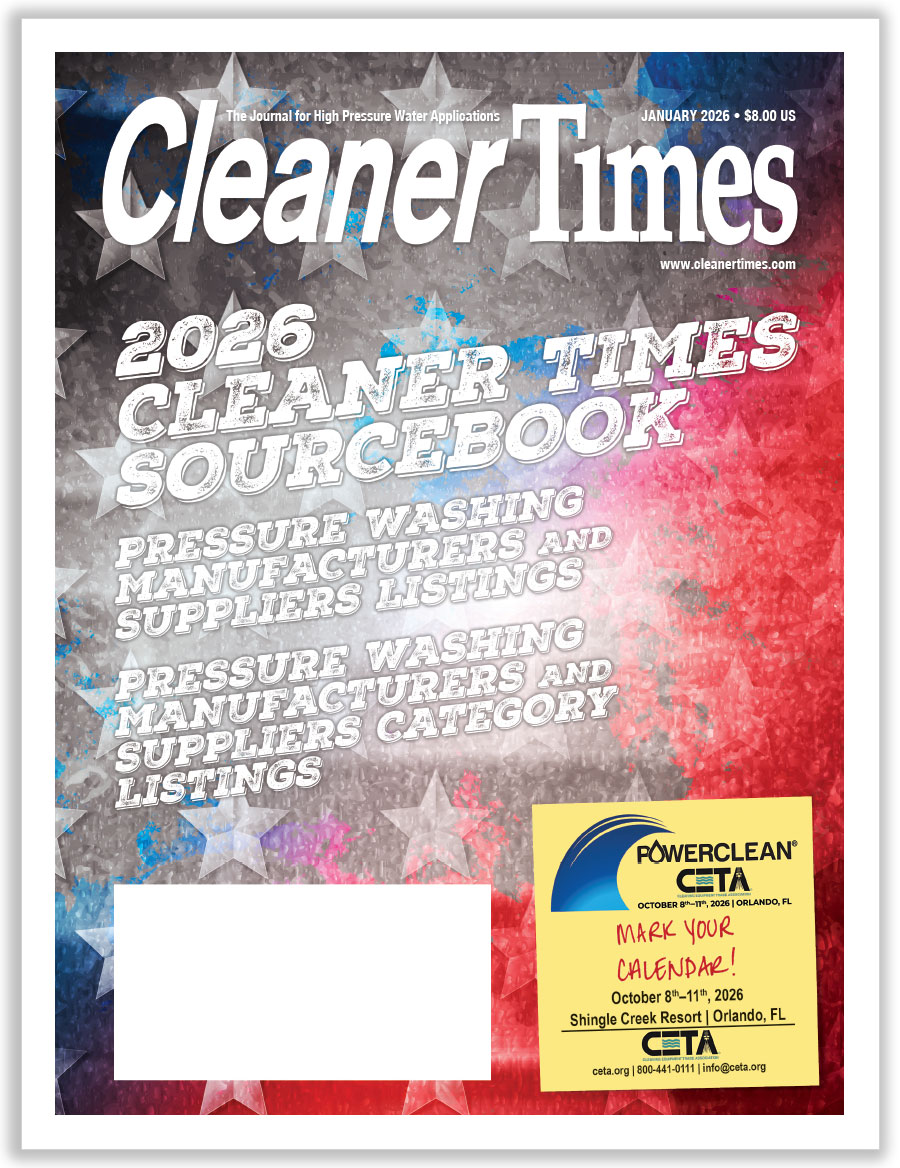
Selling Out Without Selling Out
By Mark E. Battersby / Published October 2017

Sooner or later, everyone wants to retire. For those who own a closely-held or family-owned pressure cleaning business, retirement is more than just a matter of deciding not to go into the field, the shop, or the office anymore. In addition to ensuring there will be enough money to retire, pressure washing business owners, shareholders, and partners should think about what will happen to the business when they are no longer in control.
Many who have invested a great deal of time, money, and energy into their pressure cleaning business want to see the business continue and flourish after their departure. For them, strategies for selling out without actually selling outright allow the pressure washing or waterjetting operation to remain in the hands of the family or key employees while the principal begins easing out and relinquishing control as desired.
Exit Strategies
One strategy, the family limited partnership (FLP), has over the years proven itself an extremely valuable tool for both business and estate planning. After all, what other tool can ease or even eliminate the tax bite often associated with transferring the pressure cleaning business—or its income—to family members, all the while keeping the owner’s current tax bills to a minimum?
Typically, an FLP is formed by the older generation, usually the parents, who contribute assets to the partnership in return for both general partnership units and limited partnership units. The parents can then embark on a plan of giving unlimited partnership units to their children and grandchildren while retaining the general partnership units that actually control the partnership.
Thus, the parents might retain control of the business and draw a salary or wages from it, all the while sharing the profits with other family members who are taxed on those profits at a tax rate that is usually lower than that of the parents/owners.
Selling the pressure washing business to its employees using an Employee Stock Ownership Plan (ESOP) allows the sale proceeds to be rolled over on a tax-deferred basis. In addition to being an excellent exit strategy with significant tax savings for the owners, shareholders, and members of pressure cleaning busi-nesses, ESOPs are great for motivating and rewarding employees—and for taking advantage of incentives to borrow money for acquiring new assets in pretax dollars.
The ESOP can borrow money to buy out the owner’s stake in the business. If, after the stock purchase, the ESOP holds more than 30 percent of the business’s shares, the owner can defer capital-gains taxes by investing the proceeds in Qualified Replacement Property or QRP such as stocks, bonds, and certain retirement accounts to help provide income during retirement.
Exit Tax Planning
Obviously, if the goal is to move ownership of the business to future generations, the best time is in the early stages of the operation when values are low. Planning to sell the business early can mean using the Qualified Small Business Stock.
Selling pressure cleaning stock as small business stock qualifies the profits resulting when it is sold for a lower tax rate—50 or 100 percent exclusion on the gain. The trick is meeting the definition of small business stock, and it’s easier if the business was set up with that in mind: you can’t be in the services business, for example. But it’s possible to separate out part of an existing business that would count and treat it as a separate business.
Selling Assets or Stock
The size of the tax bill when selling out depends largely on the structure of the business, whether the business is being sold as a set of assets or as an entity. In the eyes of the IRS, selling the business involves selling a collection of assets including real property, equipment, inventory, and goodwill.
Whether structured as a taxable asset or as a stock transaction, it is important for both parties to decide on the sale’s structure before agreeing on the terms of the transaction. Buyers generally prefer purchasing assets because (1) they can obtain a step-up in the book value or basis of the pur-chased assets for larger tax deductions in the future, and (2) there is little or no risk the buyer will assume any unknown seller liabilities.
Sellers, of course, usually prefer to sell stock in order to obtain clear, long-term capital gain treatment for the sale proceeds. A seller holding stock in an incorporated pressure cleaning business (or in some S corporations, such as those subject to built-in gains rules) may, in effect, be forced to sell stock because an asset sale would be subject to tax at both the corporate and the shareholder level.
In a stock sale, the buyer gets no step-up in the book value of the pressure cleaning business’s assets. Therefore, the buyer will presumably pay the seller less for a stock transaction than an asset deal. What’s more, in a stock transaction, sellers are often required to indemnify buyers for liabilities that are not expressly assumed.
Selling an equity interest in a pass-through entity such as an LLC, S corporation, or partnership can often be treated as an asset sale even though it appears on its face to be a “stock” sale. This type of transaction is treated as an asset sale for tax purposes, with the buyer getting a step-up in the basis or book value of the assets even though, technically, he acquired stock. The seller would be treated as selling the individual assets of the S corporation with a portion of the gain treated as ordinary income. A similar result occurs if interests in an LLC or partnership are transferred to a buyer.
Selling on Installments
An “installment” sale is a method that allows any capital gain to be partially deferred to future tax years. Installment sales require a buyer to make regular payments, or installments, or on an annual basis, plus interest payments.
While it may seem advantageous to get a lump sum of money when selling a piece of property or the entire pressure washing operation, using the installment method can provide a number of benefits to the seller. The largest benefit, of course, is the ability to defer capital gain taxes and spread them over time as proceeds from the sale are received. If, for example, property that has appreciated $100,000 in value is sold for a lump sum, capital gain taxes on the entire amount of gain would be immediately taxable. Spread-ing the sale over a five-year period might mean that only $20,000 of capital gain would be counted each year.
Another advantage not to be overlooked is the interest that will be collected each year. Immediate receipt of the entire sale proceeds means losing out on potentially thousands of dollars in extra interest that might have been paid with an installment sale.
Allocation
While gain from the sale of the pressure cleaning business can be partially deferred with an installment sale, allocation of that purchase price is even more important. When selling business assets, the federal tax rate on gains can vary from 15 percent (long-term capital gain) to 39.6 percent (ordinary income tax rates). Thus, sellers and buyers need to reach agreement on the allocation of the total purchase price to the specific assets sold or acquired.
When John Jones recently sold his business, including the buildings, land, equipment, a covenant not to compete, and the biggest part of the sale—goodwill and going-concern value—he treated it as capital gain. Unfortunately, the goodwill largely represented contracts the seller had providing services to a number of customers, including several municipalities, which the IRS re-characterized as ordinary income, not capital gain.
Fortunately, the U.S. Tax Court agreed with our John Jones, who claimed the sale of contracts fell under the tax law’s Section 1253, Transfers of Franchises, Trademarks and Trade Names, which allows capital gain treatment when a “franchise” is sold. Apparently, contracts are considered franchises, a term that gives one of the parties the right to distribute, sell, or provide goods, services, or facilities within a specified area.
Related Parties
All too often, unsuspecting pressure cleaning business owners find themselves facing penalties, fines, and substantial tax bills because the ever-vigilant IRS has ignored a past transaction it views as having been conducted by “related persons.” That’s right; different transactions have different definitions. In fact, related persons or parties can include much more than an immediate family member such as parents and children. Ancestors and lineal descendants, a partner and a partnership, a share-holder and a corporation, etc., are all considered “related” by the IRS. Sometimes indirect ownership, such as where an individual may be deemed to own an interest in a corporation merely because a brother owns shares, is included in the “related” definition.
Obviously, before deciding whether to sell the pressure cleaning business or begin planning for the operation to continue in your absence, the opinion and guidance of a qualified advisor should be sought and followed. After all, the taxes saved may be yours or your heirs.





